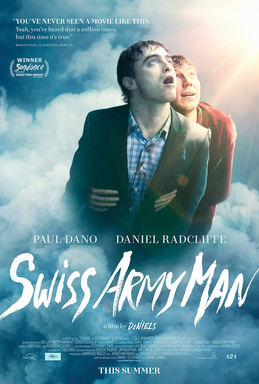“Swiss Army Man,” written and directed by Daniel Kwan and Daniel Scheinert, shines shamelessly in the bizarre and awkward and delivers a truly unique take on how mankind should approach life. The film is deeply philosophical, with Daniel Radcliffe (from the “Harry Potter” film series) and Paul Dano (from “There Will Be Blood”) adding landmark performances to their already impressive bodies of work.
The film opens with Hank, played by Dano, stranded on an island preparing to hang himself. As he positions the noose around his neck and looks out to sea one last time, he spots a man floating near the shore. Hank rushes to save Manny, played by Radcliffe, and the two embark on a journey that helps them redefine the meaning of life.
Without saying too much, it is very difficult to know whether or not the events taking place throughout the majority of the film are actually happening. After all, Hank is stranded on an island without food and water. “Swiss Army Man” could very well be a 95-minute hallucination. As films go, subjective interpretations of theme and meaning are commonplace and this is where “Swiss Army Man” begins to captivate. Manny is apparently dead, but he blasts Hank away from the island thanks to his super powered flatulence, and as the film unfolds, Manny reveals a wide array of abilities that help Hank overcome isolation.
Perhaps Manny’s most influential skill is his inquisitive nature. Manny asks Hank various questions about life and Hank guides him in the ways of the living, explaining everything from defecation to masturbation to love.
It is difficult to ignore the self-reflective nature of “Swiss Army Man.” Since the revival of a dead man is so far-fetched, the film may illustrate Manny as a mirror image of Hank residing in his conscience. Manny could be a representation of how Hank views himself.
Through the discussions they have, Hank’s inauspicious take on life is revealed to be quite synonymous to that of a dead man. Like a corpse in a coffin, Hank’s existence is confined, stationary and completely void of zeal.
Furthermore, Hank is physically separated from society by being stranded on the island, an event of mere chance, but it becomes increasingly clear that he was just as isolated in the real world, an event made possible almost entirely by choice.
“Swiss Army Man” also presents a sense of sadness hovering over society. Hank frequently explains to Manny the cultural norms designed to keep everyone in line, but in actuality these customs may prevent people from being truly honest to the self and genuinely open with others.
Radcliffe is superb as Manny. Playing a dead person in a full-length film with only two main characters must be difficult, yet he pulls it off beautifully. Radcliffe progresses from completely immobile and mute to increasingly useful and talkative. Dano’s performance is quirky and original. As a stand alone rendering of a castaway, Dano’s performance may not work, but Radcliffe’s execution of Manny definitely elevates Dano’s acting.
The film starts slowly, but the middle is full of fantastic dialogue and humorous scenes. Those scenes are some of the film’s most beautiful, bursting with color and emotion.
The end of the film is the most unrefined piece. A movie of this nature seems difficult to wrap up neatly, so the conclusion fell a bit flat. Overall, “Swiss Army Man” is cerebral and entertaining. The actors’ performances are definitely noteworthy and one will be hard pressed to find a film that matches the creativity.







